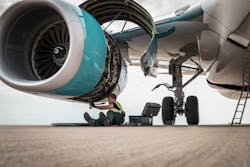Protecting Modern Jet Engines – More Time Flying with the Right Turbine Engine Oil
Since jet engines took flight in 1939, the turbine engine has become one of the most important breakthroughs in aviation history. It has revolutionized the way we fly, enabling more people to travel further. But it’s critical that increased flying time should not be accompanied by increased maintenance costs. Aviation lubricants providers have a key part to play in helping customers reduce maintenance and operating expenditure, at a time when protecting an airline’s bottom line has never been more vital.
Demands of the Modern Jet Engine
As new innovations in airframe and aircraft engine technology enable planes to fly longer, this puts increased pressure on turbine engine oils (TEOs) to perform. For example, whilst propulsive and thermal efficiency improvements have been made to enable engines to travel further distances, this results in today’s engines operating at significantly higher temperatures than those designed in the 1960s. Together with a desire to optimize efficiency through a reduced oil system size, this means a smaller oil volume needs to work harder and have a higher heat capacity to remove heat from the bearings.
In addition to performing under higher temperatures, the TEO must also protect the engine for a longer period of time. Modern engines have been developed to be more reliable and, in the interest of efficiency, operators are striving to extend time on the wing. Operators therefore depend on TEO to last longer periods in between maintenance overhaul – further increasing the importance of avoiding coking in the engine.
The Impact of Coking
One area where aircraft operators can make efficiencies in aircraft maintenance is tackling coking, a costly phenomenon that can result in significant financial implications for airlines. Coking is the build-up of unwanted carbon deposits in the engine, which are formed when oils are placed under high engine temperatures.
If preventative measures are not taken, the additional maintenance costs and safety implications can be significant. Coking can block oil filters and oil, scavenge, vent and feed pipes, possibly leading to bearing failures due to oil starvation. Failing to protect the engine from coking can also increase maintenance bills further due to more frequent filter replacements – a further, additional expense. If left unreplaced, blocked filters could ultimately lead to engine failure.
Elastomer Compatibility
In the race to improve coking performance of TEO, oil manufacturers began searching for an effective anti-oxidant system to develop high thermal stability (HTS) oil. Whilst all turbine engines oils need to be compliant with military or civil specifications, not all engine oils act the same once they are in the engine. Anti-oxidants in some HTS oils are known to cause elastomer seal degradation. Although they are a relatively minor component when considered against the scale of an entire commercial aircraft, seal degradation can result in oil leaking in unwanted areas. This can result in a significant additional maintenance burden for the airlines. Choosing an engine oil that is elastomer friendly is a simple way to avoid this problem, delivering cost-savings and, more importantly, helping to improve safety.
More Uptime, Less Downtime
Whilst the impact will vary across airlines, for many, using an inadequate TEO could be creating unnecessarily high operating costs and ultimately result in less time flying. As an industry, these past few months have been a difficult reminder of the reality that when it comes to grounded aircraft, time is money. So, when it comes to competing in a market where higher engine temperatures are the norm, airlines need to ensure that it doesn’t come with lost revenue or a higher maintenance bill.
Increasingly long-haul flights needn’t inevitably lead to high levels of coking in an engine. Good upkeep of the engine through using the right TEO is a cost-effective and efficient way of avoiding unnecessary maintenance. By using a TEO that can handle higher temperatures, scenarios such as coking of oil feed or scavenge tubes can be reduced – or even avoided altogether. This is because high-thermal-stability (HTS) oils that are designed specifically to provide long-term thermal and oxidative stability can continue to provide engine lubrication at higher temperatures, for longer. This meets both the higher temperatures and lower maintenance levels characteristic of modern jet engines, protecting fleets both in the air and on the ground.
Working closely with OEMs and industry innovators has been a cornerstone of Shell’s TEO business for decades – in fact, when it comes to the jet engine, Shell has been there right from the very start. Back in 1936, while Frank Whittle was developing the first combustion chamber, Shell’s contribution was crucial to get his jet engine into the air. Since then, partnering with visionaries has been at the core of developing turbine engine oils to fulfil the needs of the aviation industry.
A Bright Future with the Right TEO
As the aviation industry works together to recover from the impact of the pandemic, reducing operational costs is important. Choosing the right TEO is a simple and a proactive choice that airlines can make to help reduce the financial burden and disruption caused by unnecessary engine maintenance.
Saskia Boeve is General Manager at Shell Aviation Lubricants.
